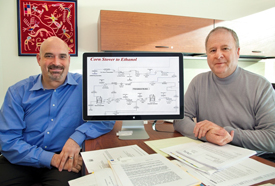Berkeley Scientists at AAAS Highlight Challenges of Meeting State Energy Goals by 2050
California is showing the way for the rest of the nation in terms of reducing greenhouse gas emissions, having set an ambitious goal to reduce these emissions to 80 percent below 1990 levels by the year 2050. Given that energy demand is projected to double by 2050, experts agree that the state will have to dramatically overhaul its energy systems to achieve its greenhouse gas emission goals.
At the 2011 Annual Meeting of the American Association for the Advancement of Science, some of the specific challenges and issue ahead were discussed in a session titled “Portraits of the California Energy System in 2050: Cutting Emissions by 80 Percent.” Contributing to this discussion were two scientists from Berkeley Lab and one from the Energy Biosciences Institute (EBI), in which Berkeley Lab is a partner. (more…)

